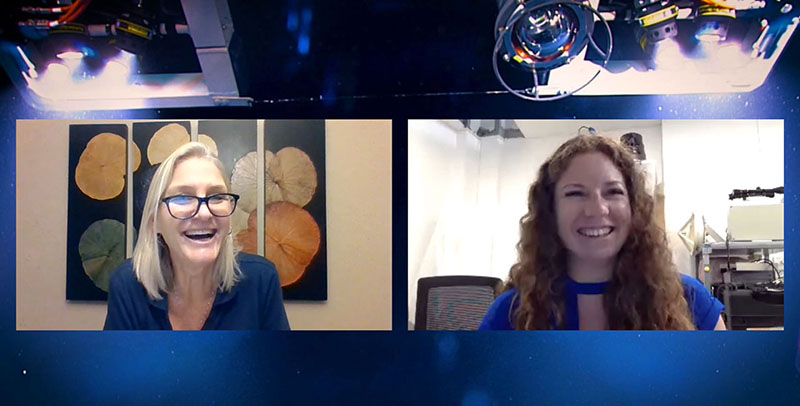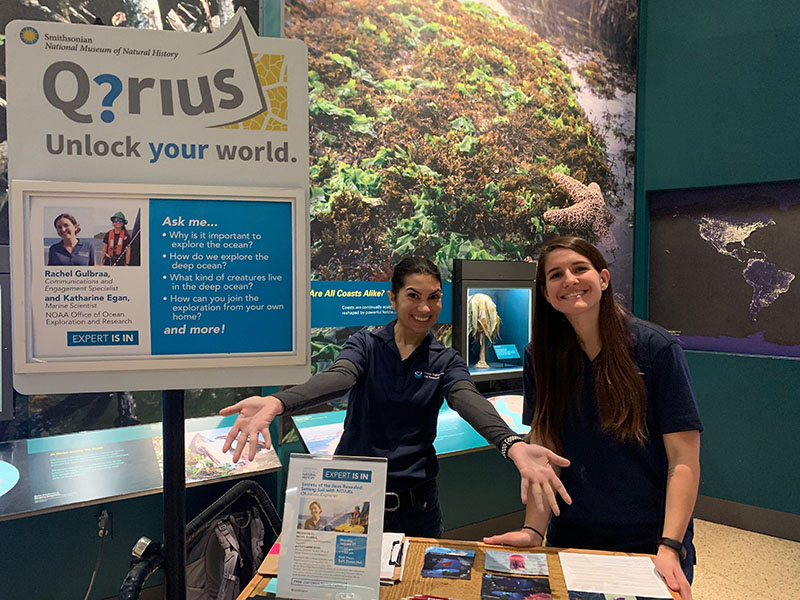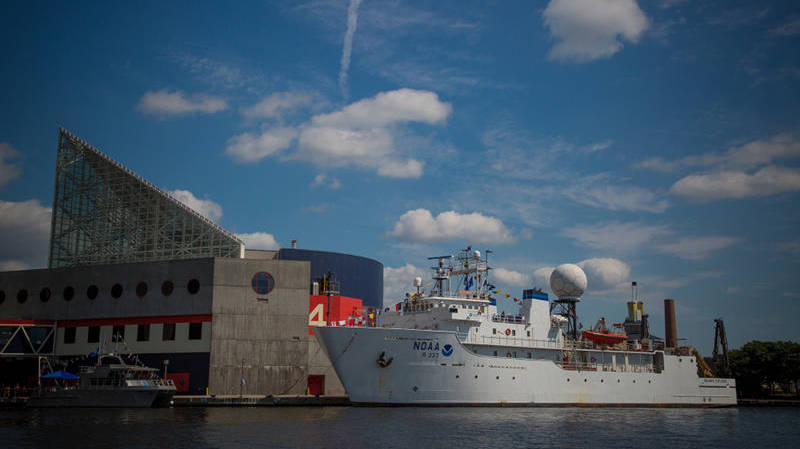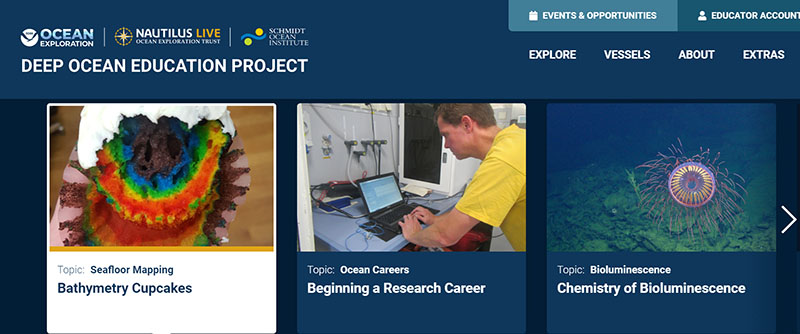Celebrating 20 Years of NOAA Ocean Exploration
Outreach and Education
From our livestreamed dives enjoyed by thousands to our internship programs and educator workshops, our popular Ocean Facts webpage to our shipboard live interactions, outreach and education efforts are foundational to our mission to explore the ocean for national benefit. Below are just some of the events and ongoing endeavors that have taken place over the last 20 years in an effort to reach, inform, and engage the public and future generations in the excitement of ocean exploration.
Ocean Exploration in the Classroom: Reaching Students Through Educators
Over the years, education staff at NOAA Ocean Exploration have built a national professional development program aimed at delivering training, resources, and engaging experiences to a vital audience: formal and informal educators. These opportunities provide educators with creative activities to enhance experiential learning, instructional practices, and resources that support U.S. Next Generation Science Standards to empower them to bring ocean science and exploration topics alive in their own classrooms and informal educational settings. Through long-standing Education Alliance Partnerships with over a dozen aquariums, science centers, universities, and national marine sanctuaries throughout the United States and U.S. territories, over 500 full-day professional development workshops have been held since 2003, reaching more than 11,300 teachers and many times more students. Throughout the years, the office has been responsive to the shifting needs of the education community, most recently with a shift to online learning during the COVID-19 pandemic.

NOAA Ocean Exploration Program Manager Susan Haynes discusses underwater robots with Antonella Wilby, a robotics engineer and National Geographic Explorer, during an online NOAA Ocean Exploration educator professional development workshop. Image courtesy of NOAA Ocean Exploration.
A Touchpoint in Our Nation’s Capital: Supporting the Smithsonian’s Sant Ocean Hall
In response to the U.S. Commission on Ocean Policy's recommendations in 2004, the Bush Administration released the U.S. Ocean Action Plan with the goal of fostering responsible use and stewardship of ocean and coastal resources through actions promoting lifelong ocean education. The plan specifically called for NOAA support of the Ocean Science Initiative at the Smithsonian Institution, which was designed to advance scientific understanding of the ocean and public awareness of its importance.
The collaboration between NOAA and the Smithsonian supports this goal and builds upon existing educational programs and activities designed to enhance public awareness and understanding of ocean and climate science. Among other things, the initiative included Sant Ocean Hall, a national exhibition on the global ocean. NOAA Ocean Exploration led a NOAA cross-agency effort in a five-year partnership with Smithsonian's National Museum of Natural History (NMNH) to collaboratively envision and develop the hall.
Opened in September 2008, Sant Ocean Hall is a 23,000 square foot permanent exhibition on the global ocean. By integrating expertise from NOAA and NMNH, the exhibition demonstrates how understanding our ocean is central to understanding and sustaining our world and builds upon mutual interests in marine research, collections, and ocean literacy. The NMNH receives more than 4 million visitors per year, with an estimated 70% of museum visitors touring Sant Ocean Hall.

In January 2020, NOAA Ocean Exploration staff eagerly awaited questions from the public as a part of the “Secrets of the Sea Revealed” program in Sant Ocean Hall in the Smithsonian’s National Museum of Natural History. Image courtesy of NOAA Ocean Exploration.
Next Gen Explorers: Launching the Explorers-in-Training Program
As part of our mission to train the next generation of ocean explorers, including scientists, engineers, and communicators, NOAA Ocean Exploration hosts students in the Explorer-in-Training Program. These interns gain valuable, interdisciplinary experience in ocean exploration while collaborating on various office projects and expeditions. Explorer-in-Training internships enable students to increase their competitiveness for educational and career opportunities in ocean-related fields. Historically, these internships have centered on hydrography and seafloor mapping, but the program was recently expanded to include exploration education, media, and science communication; expedition operations and coordination; and ocean exploration science and technology.
Since 2009, NOAA Ocean Exploration has hosted over 120 explorers-in-training. For many, this experiential opportunity was invaluable in subsequent academic and career pursuits.

2017 explorer-in-training Claudia Thompson (center) is shown here with NOAA Ocean Exploration mapping lead Elizabeth "Meme" Lobecker (right) and fellow explorer-in-training Brandon O'Brien (left) at work at the University of New Hampshire's Center for Coastal and Ocean Mapping. Image courtesy of NOAA Ocean Exploration.
Learn moreA Star-Spangled Spectacular: America’s Ship for Ocean Exploration Comes to Baltimore
In 2014, NOAA Ocean Exploration partnered with Baltimore’s National Aquarium to host events during the Star-Spangled Spectacular, a celebration of maritime history and commemoration of Maryland’s contributions to the defense and heritage of the nation, including the birth of the national anthem. NOAA Ship Okeanos Explorer, “America’s Ship for Ocean Exploration,” and other NOAA vessels were opened to the public for tours in Baltimore Harbor, providing the backdrop to highlight NOAA’s leadership across ocean issues. More than 2,000 members of the public and 18 groups of regional partners including the National Aquarium, the Bureau of Ocean Energy Management, and the Mid-Atlantic Regional Council on the Ocean were able to tour Okeanos Explorer.
Additional highlights included the presence of NOAA Research Vessel Bay Hydro II, NOAA’s primary platform to survey the Chesapeake Bay; a live interaction hosted by the National Aquarium featuring mission personnel from both Okeanos Explorer and Ocean Exploration Trust’s Exploration Vessel Nautilus; and a pier-side tent with National Aquarium exhibits and activities for children. (Fun fact: during the event, kids were treated to a special appearance by Captain Barnacles and Kwazii Kitten of the children’s series “The Octonauts.” A “NOAA and the Octonauts” podcast initiative from NOAA Office of Education brings in experts to help caretakers and children alike learn about the real-life versions of sea creatures featured on the television show and the ocean they call home.)
In addition to the Star-Spangled Spectacular, Okeanos Explorer has been open for public tours several times over the years, including port events in 2017 in Honolulu, Hawaii, and in Apia and Pago Pago, American Samoa.

NOAA Ship Okeanos Explorer is seen dressed in international maritime signal flags in Baltimore Harbor for the 2014 Star-Spangled Spectacular. Image courtesy of NOAA Ocean Exploration.
Learn moreCollaboration is Key: The Deep Ocean Education Project
In early 2021, three leaders in ocean exploration came together to launch the Deep Ocean Education Project website, an engaging “one stop shop” for ocean education materials and visual resources. Developed through a partnership between NOAA Ocean Exploration, Ocean Exploration Trust, and Schmidt Ocean Institute, the website combines standards-aligned student activities, high-resolution images and videos, stories from the field, and information for visitors to stay up-to-date on current ocean exploration expeditions.
Visitors to the site can save resources directly to a collection they can build and organize with a free account, which can then be shared with colleagues or friends. An interactive map, tri-ship calendar, and livestreaming notifications make it easy to follow ocean exploration expeditions, while an events and opportunities page enables connection to mission teams through live events, classroom programs, professional development workshops, and opportunities to join explorations at sea or onshore.
The website is a collaborative effort to increase access to education resources focused on ocean exploration science and related phenomena, and features selected resources from each organization. All materials are organized by key ocean topics and can be searched using filters for grade level, resource type, and U.S. Next Generation Science Standards.

The front page of the newly launched Deep Ocean Education Project, a collaborative effort by NOAA Ocean Exploration, Ocean Exploration Trust, and Schmidt Ocean Institute to provide an engaging “one stop shop” for educational ocean education materials and visual resources. Image courtesy of the Deep Ocean Education Project.
Learn moreEngaging with the public and supporting and inspiring the next generation of ocean explorers will always be a key component of the NOAA Ocean Exploration mission. Anyone is welcome to follow along via our website and our social media platforms, including the NOAA Ocean Exploration Facebook page and our education-specific Facebook page, as well as Instagram, and Twitter. Also be sure to periodically check out our website’s education page, as content here is currently being updated and fresh materials are added regularly.

